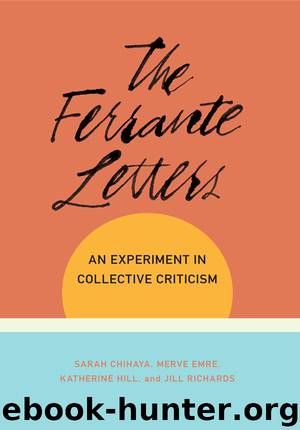The Ferrante Letters by Sarah Chihaya;Merve Emre;Katherine Hill;Jill Richards;

Author:Sarah Chihaya;Merve Emre;Katherine Hill;Jill Richards;
Language: eng
Format: epub
Tags: LCO010000, Literary Collections/Essays, LIT004200, Literary Criticism/European/Italian
Publisher: Lightning Source Inc. (Tier 3)
Published: 2020-01-06T16:00:00+00:00
8.
I had a drink with my friend Rebecca last night, one of the veteran Lila-Lenùs of my life. I am, I think, very prone to this kind of deep-cut friendship; deep-cut because it seems to go right to your core (painfully, wonderfully), and deep-cut because that kind of friend knows the words to all of your B-sides and ephemeral singles, all of those moments and memories that aren’t on any top-ten list. My relationship with her has been, as they say, formative.
Last night we talked about one of the funny things about our relationship—how differently we remember things. I like to call her my memory palace because she stockpiles and catalogues moments and events in a way that I do not, cannot. I don’t clearly remember any of the formative events you’re supposed to remember in the traditional, plot-driven version of Bildung; I don’t remember my first major lie or first kiss or the first time I had sex or the last time I saw a friend before he died too young. She, on the other hand, remembers word-for-word things that people said to her that became personal laws or prohibitions, granular feelings that solidified into actions and habits, moments that were definitive and shaping, events like building blocks that make her what she is today. When challenged to describe the same moment dredged up from years ago, we do it completely differently—yet these opposing memories come together and make something fuller and more true (“She was trying to understand, we were both trying to understand, and understanding was something that we loved to do” [MBF, 170]). We cleave to and from each other in both senses of that weirdly doubled word: we crave closeness, to form and be formed by the other, and yet we each also form ourselves against the other, sometimes in simple opposition but also in amorphous resistance or inexplicably violent rejection. The insufficient “covering,” to use Lila’s word, that we use to loosely contain these often nonsensical and lawless practices, is friendship.
A formative friendship. A formative text. Both of these things are important here because at their best, they demand critical consideration of the work of self-forming, being formed, and unforming, which—hopefully—leads towards a clearer understanding of the shape of the individual. The Neapolitan Quartet’s slow enactment of a near-lifelong friendship demonstrates this work of internal tension and critique through its characters, and in a weird way, also through their readers. In Frantumaglia, Ferrante writes that, “We are heterogeneous fragments that, thanks to impressions of unity—elegant figures, beautiful form—stay together despite their arbitrary and contradictory nature” (FR, 368). The truly marvelous unpleasure of reading Ferrante has to do with the fact that she forcibly reveals those fragments that always hide under the mask of beautiful form in a text (or in a person) whether we want to see them or not. In so doing, we might look inwards and see our own rough, unfinished seams, not completely stitched together, perhaps already in the midst of falling apart.
Download
This site does not store any files on its server. We only index and link to content provided by other sites. Please contact the content providers to delete copyright contents if any and email us, we'll remove relevant links or contents immediately.
| African | Asian |
| Australian & Oceanian | Canadian |
| Caribbean & Latin American | European |
| Jewish | Middle Eastern |
| Russian | United States |
4 3 2 1: A Novel by Paul Auster(11052)
The handmaid's tale by Margaret Atwood(6855)
Giovanni's Room by James Baldwin(5879)
Big Magic: Creative Living Beyond Fear by Elizabeth Gilbert(4723)
Asking the Right Questions: A Guide to Critical Thinking by M. Neil Browne & Stuart M. Keeley(4576)
On Writing A Memoir of the Craft by Stephen King(4214)
Ego Is the Enemy by Ryan Holiday(3991)
Ken Follett - World without end by Ken Follett(3973)
The Body: A Guide for Occupants by Bill Bryson(3802)
Bluets by Maggie Nelson(3711)
Adulting by Kelly Williams Brown(3671)
Guilty Pleasures by Laurell K Hamilton(3587)
Eat That Frog! by Brian Tracy(3514)
White Noise - A Novel by Don DeLillo(3436)
The Poetry of Pablo Neruda by Pablo Neruda(3367)
Alive: The Story of the Andes Survivors by Piers Paul Read(3311)
The Bookshop by Penelope Fitzgerald(3229)
The Book of Joy by Dalai Lama(3218)
Fingerprints of the Gods by Graham Hancock(3214)
